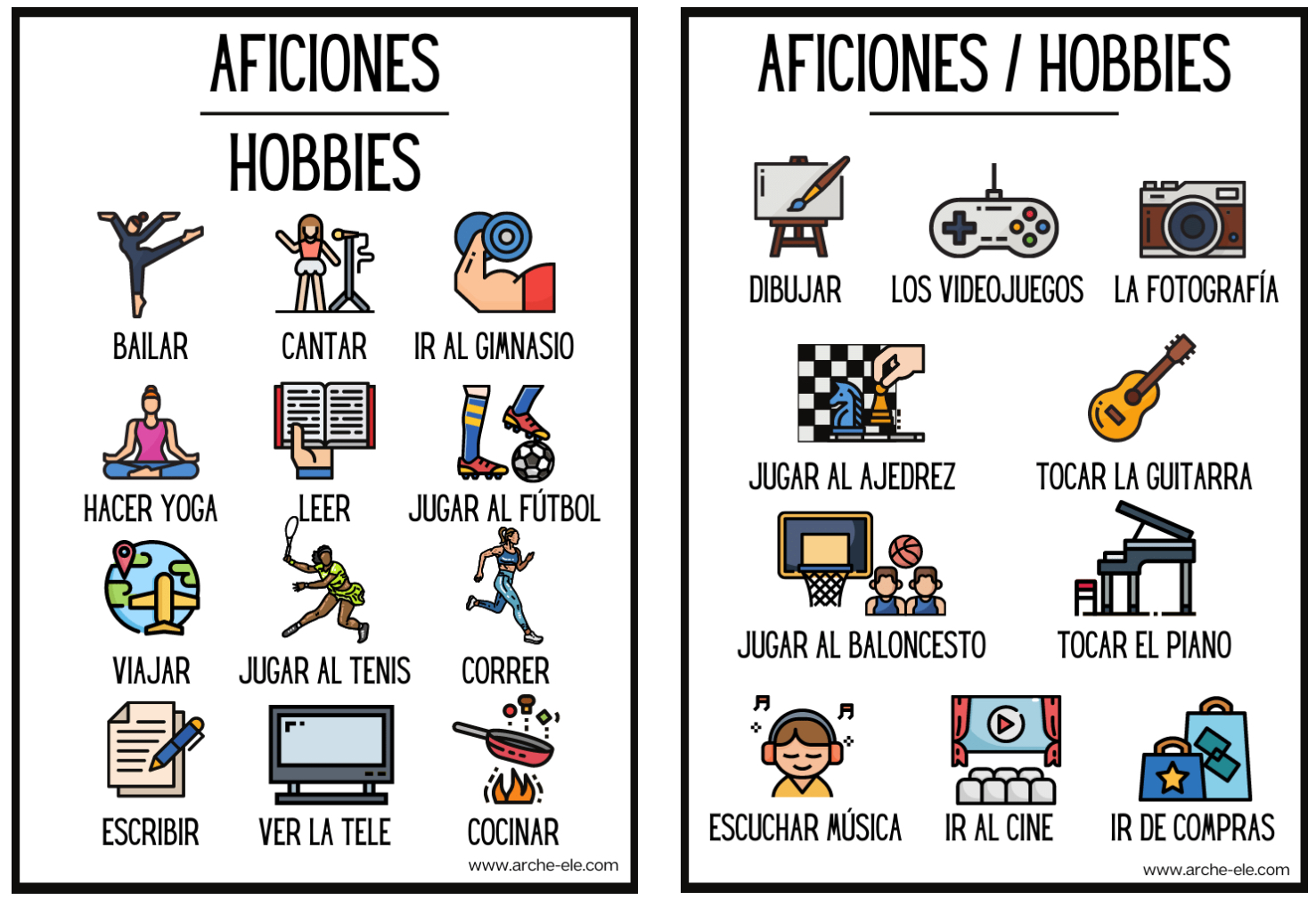Semana 5 (Jugar e ir, gustar y la hora)
Las actividades favoritas

Otras actividades
| coleccionar monedas | collect coins | pintar | to paint |
| el senderismo | hiking | coser | to sew |
| la jardinería | gardening | cazar/la caza | hunting |
| los rompecabezas | puzzles | la cerámica | pottery |
| esquiar/el esquí | skiing | acampar | to camp |
Do you know how to conjugate “ir” (to go) and “jugar” (to play)?
| Jugar | Ir | |
|---|---|---|
| Yo | Juego | Voy |
| Tú | Juegas | Vas |
| Él/ Ella/ Usted | Juega | Va |
| Nosotros/ Nosotras | Jugamos | Vamos |
| Vosotros/ Vosotras | Jugáis | Vais |
| Ellos/ Ellas/ Ustedes | Juegan | Van |
El verbo "gustar"--to like
Gustar doesn't act like other verbs--subject verb object--it is the opposite:
object (the person) + verb + subject (the thing)
You are saying the "thing" is pleasing "to" the person.
Me gusta el chocolate. (Chocolate is pleasing to me). But we translate it to say "I like chocolate."
Since chocolate is the subject now, the verb agrees with it, NOT the person being pleased. The pronouns for the person are not the ones you know (yo, tú, Ud., etc.) because the person is NOT the subject, but rather these pronouns for indirect objects:
(no) me nos
te os gusta/gustan (subject—singular or plural)
le les
te os gusta/gustan (subject—singular or plural)
le les
To agree with someone talking about likes, you can say "a mí también" [me too] (not yo también). If they say something they don't like and you don't like it either you say "a mí tampoco" [me neither].
You can add the person (for clarification or emphasis) by putting "a" then a person:
A Alfonso le gusta la música. It is extra information, not required.
A ti te gustan los libros.
A mí me gusta el senderismo.
A mis papás les gusta pintar.
(They also can be placed at the end--Le gusta dibujar a Daniel)
Don't make the common mistake of forgetting the "a", otherwise it's wrong:
¿Qué te gusta?
¿Qué te gusta hacer?
¿Qué ropa te gusta llevar?
¿Qué color te gusta más?
¿Te gusta bailar?
Expresar la hora

if you want more practice - https://www.profedeele.es/actividad/la-hora/
To laugh a little bit:
¿Qué hora es?
¿A qué hora es la clase de español?
¿A qué hora te gusta ir a la universidad?
¿Dónde te gusta estudiar?
¿A qué hora vas a casa los lunes?
¿Adónde vas cada día?
¿Vas a leer hoy? ¿Qué vas a leer?
¿Dónde te gusta viajar?
¿Qué le gusta tu mejor amigo/a?
¿Adónde vas de vacaciones normalmente?
¿Qué color de ropa te gusta?
¿Qué color de ojos te gusta?
¿Qué no te gusta hacer?
¿Qué te gusta?
¿Qué no te gusta del verano?
¿Qué no te gusta hacer los fines de semana?
¿A qué hora vas al cine normalmente?
¿Por qué te gusta la comida mexicana?
¿Dónde te gusta estudiar?
¿Dónde te gusta acampar?
¿Qué comida te gusta más?
¿Qué juegas?
¿Juegas un deporte?
¿A qué hora es la clase de español?
¿A qué hora te gusta ir a la universidad?
¿Dónde te gusta estudiar?
¿A qué hora vas a casa los lunes?
¿Adónde vas cada día?
¿Vas a leer hoy? ¿Qué vas a leer?
¿Dónde te gusta viajar?
¿Qué le gusta tu mejor amigo/a?
¿Adónde vas de vacaciones normalmente?
¿Qué color de ropa te gusta?
¿Qué color de ojos te gusta?
¿Qué no te gusta hacer?
¿Qué te gusta?
¿Qué no te gusta del verano?
¿Qué no te gusta hacer los fines de semana?
¿A qué hora vas al cine normalmente?
¿Por qué te gusta la comida mexicana?
¿Dónde te gusta estudiar?
¿Dónde te gusta acampar?
¿Qué comida te gusta más?
¿Qué juegas?
¿Juegas un deporte?

